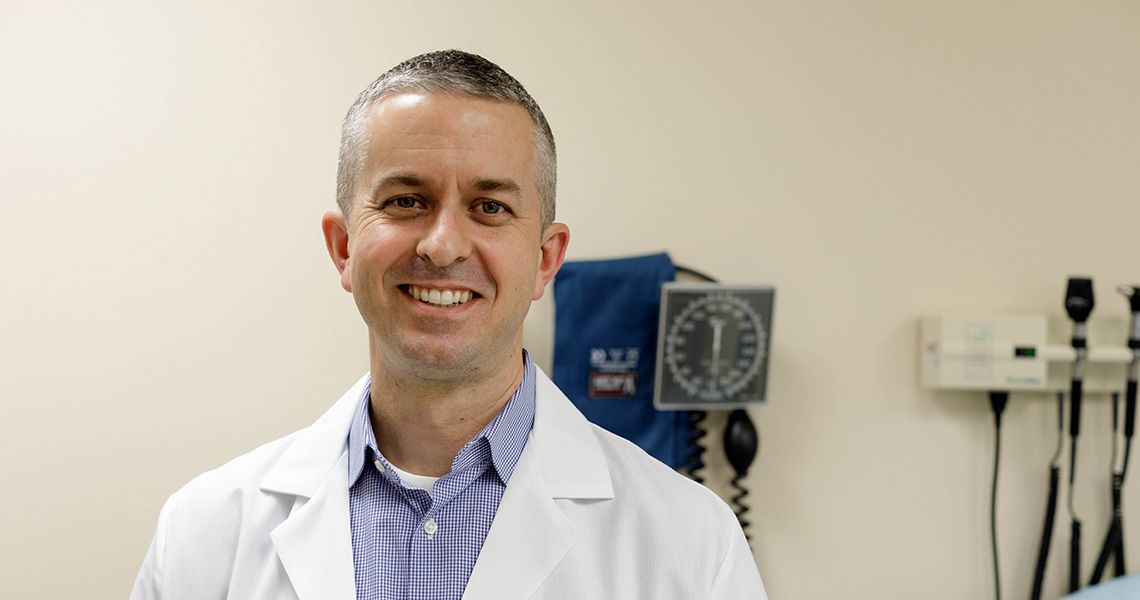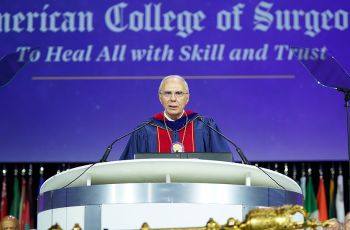For people suffering from the broad range of neurological issues, problems can quickly escalate from a mild, dull, annoying ache to persistent, severe, and disabling pain. Disc problems, nerve issues, or compression fractures can limit your ability to move and affect quality of life, but neurovascular diseases such as brain aneurysms are more urgent. Whether a patient is experiencing pain in the neck or a serious disorder, timely care from an experienced professional is crucial. For those patients, Michael Johnson, PA-C, a board-certified physician assistant in the George Washington University (GW) Medical Faculty Associates (MFA) Department of Neurosurgery, talks about some fast and easy options available through the GW Brain and Spine Immediate Access Clinic.
Q: How long has the GW MFA Department of Neurosurgery been offering the GW Brain and Spine Immediate Access Clinic?
Michael Johnson: Our clinic has been operational for about two years. Along with our expanded telehealth options, the clinic has been a great option for our patients, especially during the pandemic. Through the immediate access clinic, our department continued to offer high-level service, when it often has been hard to find care in other parts of Washington, D.C., and the DMV as a whole.
We are really more than just an immediate access clinic, we offer comprehensive neurosurgical care as well as same-day, next-day, and telehealth appointments in addition to visits scheduled in advance. The clinic represents a commitment by our department to remove all possible barriers to access for patients seeking our services. Neurosurgical care can sometimes be quite complex and overwhelming, and we want our patients to know that we are here for them.
Q: Who is this clinic aimed at serving?
Michael Johnson: Neurosurgical care covers a broad spectrum of pathology. We treat brain and spine tumors, but we also treat other things like degenerative spine disease and peripheral nerve issues, such as carpal tunnel syndrome and ulnar neuropathy. Degenerative spine disease not only includes common problems like neck or back pain, but also disc herniations, sciatica, compression fractures, and spinal stenosis. We also offer expertise in spinal deformities such as scoliosis and kyphosis, and we help patients who have had prior surgeries. Our providers are also
experts in managing neurovascular diseases, including carotid stenosis, brain aneurysms, and arteriovenous malformations.
We are also happy to provide second opinions for patients who care planning care at other facilities.
Q: What kinds of services and specialists are available at the clinic?
Michael Johnson: Our immediate-access clinic is staffed primarily by certified physician assistants (PA). Each of the PAs has more than seven years of dedicated neurosurgical experience. They’re supervised by board-certified and fellowship-trained neurosurgeons who help to create individualized care plans and management options for our patients. Our PAs can order and interpret imaging tests such as CTs and MRIs, order physical therapy, and make referrals to other specialties, including pain management and physical medicine. When non-surgical management has been exhausted, or when surgery is the most appropriate option, our surgeons provide the highest level of care
Q: When should a patient consider seeking treatment?
Michael Johnson: Every situation is unique. Some neurosurgical problems are quite urgent and require immediate evaluation, like newly diagnosed tumors or aneurysms or even weakness caused by a spine problem. Back and neck pain issues can usually be managed without a spine specialist by using non-surgical management like physical therapy and over-the-counter medications. If the pain doesn’t resolve or worsens despite conservative care, a patient should definitely be evaluated by a specialist. Some patients prefer to see a neurosurgeon early in the course of back and neck problems to help plan the treatment course. That is what we are here for — to make sure patients have access to the highest level of neurosurgical care.
Q: What’s the difference between seeking care at an immediate access clinic and going to the Emergency Department?
Michael Johnson: Our clinic should never take the place of an emergency department (ED) when there is a life-threatening issue. We do work closely with the ED to make sure that patients who were seen there have the ability to have follow-up care in our clinic in a timely manner.
For issues that are urgent but not life-threatening, we are here to provide more immediate access to care and treatment. This access improves care for patients who might otherwise wait all day in an ED and is a cost savings for patients and to the health care system as a whole.
Q: How should patients prepare for a visit? What kind of information do they need to provide?
Michael Johnson: At the first visit, we will take a comprehensive history to make sure we have a clear understanding of the patient's condition and any other medical issues that might affect care. We will want to know about any conservative measures that have previously taken place, such as physical therapy, injections, and medications. If patients have had any recent imaging, it is very important that they bring in CDs of the imaging results if those studies were performed outside of the GW system.
Q: Do community members need to be patients of a GW MFA Department of Neurosurgery physician to use the Immediate access clinic?
Michael Johnson: Not at all. Our clinic serves to provide immediate access to neurosurgical care to all patients, whether they are new to GW entirely or even if they just had a procedure by one of our providers. We want patients to know they can get prompt care whenever they need it.
Q: Do patients need a referral?
Michael Johnson: Some insurance carriers do require that patients have a referral to get care with a specialist. Anyone considering care in our clinic should check with their insurance carrier to see if a referral is required.
Q: Are there specific days or times?
Michael Johnson: We are open Monday through Friday, and our current hours are from 8 a.m.–2 p.m. and may be increasing in the future. We do offer scheduled appointments, which is the most efficient way to be seen, but walk-in patients can certainly be accommodated.
For more information, call 202-741-2750.




